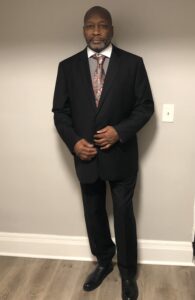Tommy Walker
Life in Prison to Liberty and Advocacy
While preparing our Preparing for Success after Prison course, I talked with Tommy Walker, III. Authorities arrested Tommy and sentenced him to three life sentences. He served more than two decades inside the walls of the United States Penitentiary in Lewisburg before the First Step Act opened an opportunity for release.
 With a reputation for holding some of the most volatile people in federal prison, time in Lewisburg could darken a person’s spirits. Tommy understood the bleakness of his sentence. The US Parole Commission did not have authority to release him. He would spend the rest of his life in prison unless:
With a reputation for holding some of the most volatile people in federal prison, time in Lewisburg could darken a person’s spirits. Tommy understood the bleakness of his sentence. The US Parole Commission did not have authority to release him. He would spend the rest of his life in prison unless:- An appeals court vacated his sentence,
- The President commuted his sentence, or
- Congress legislated a new law that the President signed.
Despite those complications, Tommy chose to live productively and prepare for success upon release—even though Tommy didn’t have a release date. Living productively requires a person to have a plan, and to execute the plan with incremental action steps. If Tommy had to spend his life inside of a federal prison, he intended to live with meaning, relevance, and dignity.
How?
He could live for something bigger than his life. Instead of complaining about the sentence imposed, Tommy decided to become useful to others. He became a better:
- reader,
- researcher, and
- writer.
Over time, Tommy developed skills in learning how to use resources in the prison’s law library. He learned about the legal process, including decisions by District Court Judges, Circuit Court Judges, and Supreme Court Justices. He read about statutes, citations, and Court rules for Civil or Criminal procedure. Tommy became a master of the Prison Reform Litigation Act, administrative remedy process, and habeas corpus.
Incremental Steps to Success:
With those skills, Tommy served his community and he also served himself. Every day he could hold himself accountable, devoting hours to learning. Those actions kept him focused on becoming more useful to people in his community.
Through his work, Tommy helped many people file pro se motions that advanced prospects for their liberty. Although he didn’t know whether opportunities would open for him to walk out of prison, he created meaning by becoming more useful by helping others.
By studying law, Tommy understood the importance of keeping a pristine disciplinary record—free of any infractions. Since he had a purpose to work toward, he avoided behavior that could lead to problems with other people in prison, either staff or others serving time.
In 2018, after 25 years inside, others noticed that Tommy Walker III had built an “extraordinary and compelling” record.

The judge considered the prosecutors’ arguments when sentencing Tommy to serve three life sentences. Those prosecutorial arguments focused on Tommy’s past behavior. Tommy couldn’t do anything to change his past decisions, and the judge sentenced him for those crimes.
Yet Tommy’s actions in prison, and his commitment to hold himself accountable, differentiated him from others.
The First Step Act:
When President Trump signed the First Step Act, a mechanism opened for Tommy to argue for liberty. Since he served a triple-life sentence for crimes that included violence, he did not complain that Earned Time Credits did not apply to him. Instead, he seized upon other opportunities that the law opened, such as compassionate release.
The First Step Act empowers every person in prison to make an argument for compassionate release. Before President Trump signed that law, people in federal prison had fewer opportunities to self-advocate for liberty. To become a better candidate for relief, however, the person should show an “extraordinary and compelling” adjustment record. People will advance their prospects for success with compassionate release if they can show that they’ve used their time to prepare for success after prison.
Tommy Walker III provides us with an example of excellence. He understood that he could not change the past. Yet through his behavior, he could build a compelling record that would persuade others to view him through a different lens.
Skilled defense attorneys told Tommy that immutable laws would block him from ever getting relief.

Despite those admonishments, Tommy believed in himself. He acted in ways that would reframe the narrative of his life. When a federal judge reviewed Tommy’s petition for compassionate relief, he didn’t only consider the history of violence or criminal behavior that led Tommy to prison. The judge also considered Tommy’s extraordinary and compelling prison adjustment. She granted his petition, allowing him to walk out of prison as a free man.
Besides developing skills while in prison, Tommy also earned credentials to become a certified paralegal. To live productively in society, he launched his own business: Second Chance 4 R.E.A.L, a paralegal service to help people in prison get relief from their sentences. Through his work, many people have gotten relief through administrative remedy, habeas corpus, and filings related to the First Step Act.




